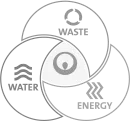To aid in the prevention of chimney fires and carbon monoxide intrusion and to help keep heating appliances and fireplaces functioning properly, the Chimney Safety Institute of America (CSIA) offers the following safety tips:
Get an annual chimney check
Have chimneys inspected annually, and cleaned as necessary, by a qualified professional chimney service technician. This reduces the risk of fires and carbon monoxide poisonings due to creosote build-up or obstructions in the chimneys.
Keep it clear
Keep tree branches and leaves at least 15 feet away from the top of the chimney.
Install a chimney cap
Keep debris and animals out of the chimney.
Choose the right fuel
For burning firewood in wood stoves or fireplaces, choose well-seasoned wood that has been split for a minimum of six months and stored in a covered and elevated location. Never burn Christmas trees or treated wood in your fireplace or wood stove.
Build it right
Place firewood or firelogs at the rear of the fireplace on a supporting grate. To start the fire, use kindling or a commercial firelighter. Never use flammable liquids.
Keep the hearth area clear
Combustible material too close to the fireplace, or to a wood stove, could easily catch fire. Keep furniture at least 36” away from the hearth.
Use a fireplace screen
Use metal mesh or a screen in front of the fireplace to catch flying sparks that could ignite or burn holes in the carpet or flooring.
Install smoke and carbon monoxide detectors
Place detectors throughout the house and check batteries in the spring and fall. When you change your clocks for Daylight Savings Time, remember to also check your detector batteries.
Never leave a fire unattended
Before turning in for the evening, be sure that the fire is fully extinguished. Supervise children and pets closely around wood stoves and fireplaces.
Have annual inspections performed by CSIA Certified Chimney Sweeps
These chimney sweeps have earned the industry’s most respected credential by passing an intensive examination based on fire codes, clearances and standards for the construction and maintenance of chimney and venting systems. The National Fire Protection Association also recommends that all chimneys are inspected on an annual basis.
This information is provided by Veolia North America to help you protect your personal safety. Content is sourced from the Chimney Safety Institute of America.

Veolia is uniquely positioned to service industry, government and commercial entities in improving performance, managing water, waste and energy.
Learn how


